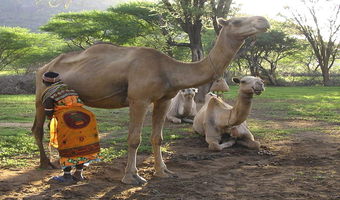 A project that gives women pastoralists market for their camel milk is insulating them during dry times when men migrate with animals in search of pasture and water leaving them vulnerable.
A project that gives women pastoralists market for their camel milk is insulating them during dry times when men migrate with animals in search of pasture and water leaving them vulnerable.
Dubbed Samburu Camel Project, the project supports the pastoralist way of life in Kenya by reducing the vulnerability of women like during the dry season. For years, women, children and the elderly in Samburu would suffer when men would migrate with their cattle and goats in search of water and pasture. But the camels offer the women of this semi-nomadic community a drought-resistant source of food and income during lean times.
Camels also act as a stash of emergency cash for women during the dry season. A herd of animals serves as a pastoralist's bank account; when there is an emergency, the family will sell a goat or cow to raise money. But when the herds migrate, women are left without access to their family's capital.
Selling camel milk provides the women with an income of their own. Samson Lebitiling, chief of the village of Ngrunit, said he has seen the women's ability to provide for their families increase exponentially after receiving the ungulates.
"It assists the children to get school fees," he says. "If someone is sick, (the women) will sell a camel and take the patient to the health center." Working with the Kenya Agricultural Research Institute, women from the project have also made dried meat, cheese and other milk-based products. And as an added benefit, camel ownership has helped to increase the status of women in this community.
"Before, the cows and the goats were owned by my husband; all the ownership belonged to him," said Leisingobanai one of the beneficiaries of the project. "But now since I have got a camel, we own all the animals together. I just thank God and the people who gave me this camel."
















Comments powered by CComment